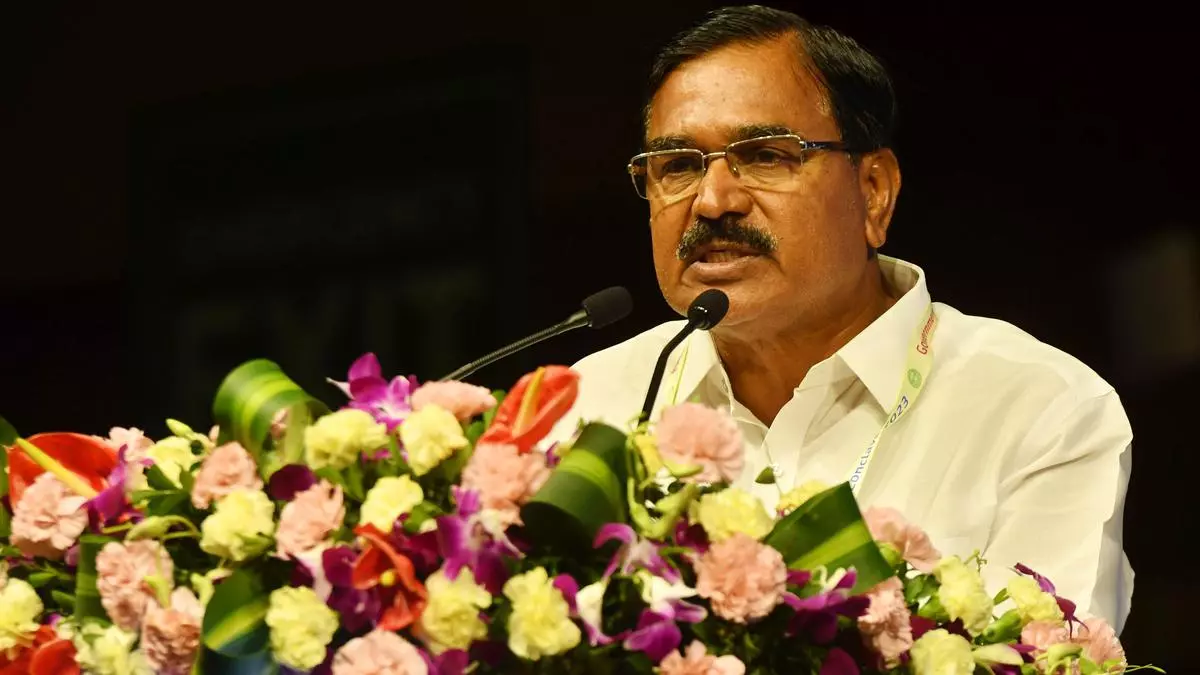Telangana ‘convincing’ farmers to shift from paddy to overcome surplus output
State Agriculture Minister Singiriddy Niranjan Reddy said Telangana farmers are convincing to gradually go for crop diversification to overcome the problem of excess rice production in the long term.
We are gradually convincing farmers to go into diversified crops. Oilseeds, pulses, vegetables and fruits..to a limited extent, we encourage farmers to shift from growing rice to other crops, he told a select group of journalists attending the Lighthouse FPO Conclave 2023, organized by Agri enterprise Samunnati. He said, “We do not discourage them (from cultivating rice).”
Procurement initiative
For the farmers to switch from rice, it will be “necessary” for the state government to purchase the surplus rice produced in Telangana. “If the Indian government is not doing the buying, then we have to buy automatically. The center may ignore its responsibility, but we cannot do that,” the minister said.
In his speech at the conclave, Reddy said that farmers of Telangana are growing surplus rice but are not getting minimum support price (MSP). How can farmers sell at low prices? That’s why we took the initiative to start buying. But how long can we keep buying? We need a solution.”
Currently, Telangana is facing an overproduction of rice. It has purchased 6 million tons of rice during the current Rabi’ marketing season. This is because the center said that it will not be able to purchase all the parboiled rice that the Telangana government buys from farmers.
The center refers to the excess stock of boiled rice due to the unwillingness to buy from the state.
using to make ethanol
On the other hand, farmers face the problem of rice cracking if they choose to produce white (raw) rice. As part of its efforts to find a solution, the state has now decided to spend ₹2,000 crore to set up rice mills across the state.
Asked if the country would consider exporting the surplus parboiled rice it has in view of the demand from Africa, Reddy said the center should allow it and the country cannot deal with foreign countries.
On whether the surplus rice can be used in the manufacture of ethanol, he said that the manufacturing units will have to determine the economic aspects. “If manufacturers come forward, we have no objection as long as they follow environmental and other laws,” the minister said.
In response to another question, he said that millet production will increase annually as people become more aware. “Basically, the consumer should be more aware than the producer,” he said.
Late sowing in the fall
The minister said that khareef sowing had been delayed by 20 days in Telangana due to the delay of monsoon. However, the cultivation of different crops will not be affected. “We still have time for cotton and the cultivation will be close to 60 acres (24.28 ha),” Reddy said.
The state will focus on oil palm cultivation by bringing in 20,000 hectares in the next 3-4 years. This year, we added 83,000 hectares. “In the current fall season, the planted area will increase to nearly 3 hectares,” he said.
The state shall provide incentives for the cultivation of oil palm as determined by the Center to promote its cultivation. He denied that palm oil is a healthy oil.
Cottonseed case
On complaints of shortage of toor (peas) in Telangana and if the state was considering any alternative, he said the center would have to import the pulses. “We’re managing in a way. We’re buying and we’re doing that (running the show).”
He said since people in the state are not accustomed to eating masoor (lentils) or muong dal (green gram) and aware of the protein, the Telangana government is not looking for alternatives to tor dal.
He said the country’s farmers are making full use of technological development.
Telangana has received an investment of Rs 700 crore from the Agricultural Investment Summit held two months ago. He said that investments are starting to appear and projects are being launched.
Concerning the farmers of the state from the high prices of cotton seeds this year, he said that the supply is abundant and there is no scarcity. “If farmers choose only one brand, there will be a shortage. But we will not allow the price of seeds to increase.”
